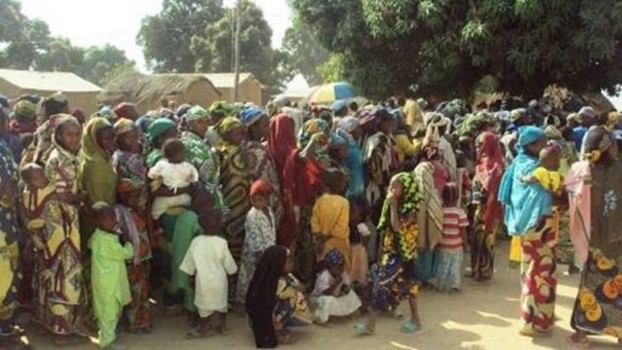Over 90,000 Persons Displaced After Election Violence In Central African Republic

Over 90,000 persons in the Central African Republic have been forced to flee from their homes since the violence visited on the country by armed groups which were against the holding of the December 27, 2020 legislative and presidential elections.
The United Nations High Commission for Refugees, Friday expressed displeasure over the increase in tension, revealing that 30,000 of the displaced persons are now refugees in Cameroon, Chad, the Democratic Republic of Congo, and Congo Brazzaville.
Speaking during a press briefing, the Boris Cheschirkov, UNHCR spokesperson, said more than 24,000 Central Africans who crossed the Oubangi river to the Democratic Republic of Congo are currently refugees in Lower Uele and North Oubangui.
The UNHCR official revealed that between January 2 and 3, 2021, at least 15,000 Central Africans arrived in the village of Ndu following attacks by rebels of the Coalition of Patriots of Central Africa (CPC) on Damara and Bangassou.
“The refugees who arrived in the village of Ndu have been a great challenge to the host families,” declared Boris Cheshirkov.
Faced with the influx of Central African refugees in neighbouring DR Congo, the UNHCR has reinforced its presence along the Oubangui river.
The objective is the respond to the needs of the new arrivals and to prepare to register them as well as to temporarily settle them further into the hinterland for security reasons.
In Cameroon, more than 4,500 Central African refugees have arrived in the border town of Garoua-Boulai while more than 2,000 Central African refugees are also in neighbouring Chad and about 70 others have reached Congo Beazzaville.
Following this new wave of refugees, the UNHCR is worried by information alleging the violation of human rights in the Central African Republic. The UN agency has thus called on all the governments of neighbouring countries to facilitate and help local authorities to register the new arrivals.
In the meantime, most of the newly-arrived refugees are fed by the host communities or at special centres and according to the UNHCR, these new arrivals are in urgent need of water, housing and access to health facilities adequately equipped to prevent the propagation of the Covid-19.
In Cameroon, a special site situated in Gado would house the new arrivals and it is there they would be registered.
Already, the World Food Programme office in Cameroon has been providing food to the Central African refugees while the UNHCR has put in place a mobile clinic.
This new spike in tension comes at a time when the voluntary repatriation of Central African refugees from Cameroon had resumed on November 20, 2020 after the said refugees had spent seven years in exile in the country and DR Congo.
More than 400 refugees were able to return to their country in November last year.
The UNHCR says the voluntary repatriation process has now been suspended.
By the end of 2020, the Central African Republic had about 1.2 million internally displaced persons.
Inside the Central African Republic itself, about 185,000 persons from at least 25 localities ran away from their homes for security reasons. They have been hiding in the bushes since December 15, 2020, according to the UNHCR.
About 113,000 persons have since returned to their homes, according to the UN Bureau for the Coordination of Humanitarian Affairs.
A total of 62,000 persons, according to the Bureau have also just been newly displaced.
According to the UNHCR, about one quarter of the Central African Republic population estimated at 4.7 million had by 2020 ending been uprooted from their places of origin with more than 600,000 living in neighbouring countries.
Support Our Journalism
There are millions of ordinary people affected by conflict in Africa whose stories are missing in the mainstream media. HumAngle is determined to tell those challenging and under-reported stories, hoping that the people impacted by these conflicts will find the safety and security they deserve.
To ensure that we continue to provide public service coverage, we have a small favour to ask you. We want you to be part of our journalistic endeavour by contributing a token to us.
Your donation will further promote a robust, free, and independent media.
Donate HereStay Closer To The Stories That Matter




